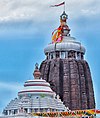Baladeba Ratha
Kabisurjya Baladeba Ratha | |
|---|---|
Athagada, Odisha, India | |
| Language | Odia |
| Genre | Odissi music |
| Notable works | Kishorachandrananda Champu, Ratnakara Champu, Chandrakala, Sarpa Janana |
Kabisurjya Baladeba Ratha (alternatively spelled Kabisurya, Kavisurya Baladev Rath,
Early life
He was born in Bada Khemundi (presently Digapahandi), Ganjam, Odisha. Baladeva Ratha's mother died when he was ten years old. He was brought up by his maternal grand father, Tripurari Hota in Athagada (who also taught him Sanskrit and Odia literature). He married at the age of 15. After his father's death, he moved to the nearby Jalantara state. The prince of Jalantara, Rama Chandra Chhotaraya encouraged his literary creations and gave him the title 'Kabisurjya', meaning 'The Sun among Poets.'
Literary works
Ratha was an
Dhumpa sangita
| Oṛiśī Sangīta |
Jagannātha |
|---|
| Composers |
|
| Shāstras |
|
| Compositions |
| Instruments |
Ratha is thought to have invented the dhumpa, a bamboo percussion instrument, that accompanies the Odia folk art form of dhumpa sangita. The dhumpa accompanies recitations of his songs called dhumpa sangeeta.[5][6] Many of his poetic pieces, especially the champu are set to dance in Odissi.[7][8][9]
Death and Commemoration
Ratha died in Athagada (Athgarh,
References
- ISBN 9788170223740.
- ^ a b Nagendra (1988). Indian Literature. Delhi: Prabhat Prabhashan. p. 454.
- ^ a b "EMINENT LITERARY LUMINARIES OF ORISSA" (PDF). Orissa Reference Annual: 292. 2004. Archived from the original (PDF) on 19 October 2013. Retrieved 27 March 2013.
- ISBN 9788172010065.
- ^ "Call to revive folk musical instrument 'Dhumpa'". The Hindu. 17 December 2007. Archived from the original on 19 December 2007. Retrieved 27 March 2013.
- ^ "Gopalpur beach fest gets under way". The Hindu. 26 December 2010. Retrieved 27 March 2013.
- ^ "Camping with concepts". The Hindu. 8 June 2012. Retrieved 27 March 2013.
- ^ "Their spot in the sun". The Hindu. 13 December 2012. Retrieved 27 March 2013.
- ^ "Odissi takes centrestage". The Hindu. 18 August 2006. Archived from the original on 28 September 2013. Retrieved 27 March 2013.
- ^ Dasarathi Das (1987). Kavisurya Baladeva Rath. Sahitya Akademi.
- ^ "Kabisuryanagar". Retrieved 27 March 2013.

